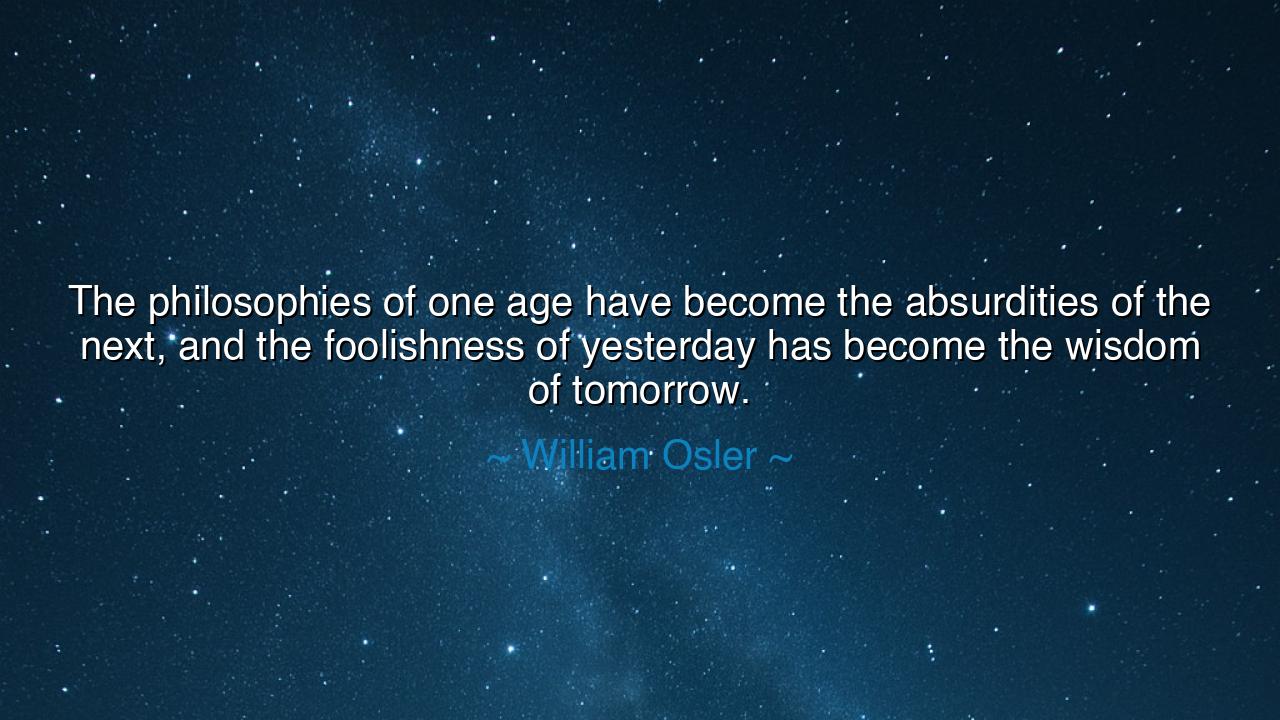
The philosophies of one age have become the absurdities of the
The philosophies of one age have become the absurdities of the next, and the foolishness of yesterday has become the wisdom of tomorrow.






The great physician William Osler, a sage among healers and thinkers, once proclaimed: “The philosophies of one age have become the absurdities of the next, and the foolishness of yesterday has become the wisdom of tomorrow.” In these words, there is both humility and revelation — a reminder that truth is not a stone fixed in the earth, but a river that flows through time. What men once held sacred becomes strange to their descendants; what they once mocked becomes the cornerstone of the future. Thus, the world turns, and wisdom itself is ever reborn from the ashes of folly.
In the ancient days, men believed the sun circled the earth, that lightning was hurled by angry gods, and that sickness was punishment from heaven. These beliefs guided civilizations, shaped rituals, and ordered the lives of kings and peasants alike. Yet with time came new light — the light of inquiry and discovery. When Copernicus declared that the earth moved, his truth was called blasphemy. When Galileo looked to the heavens through his telescope, the guardians of wisdom branded him heretic. But the fire that is truth cannot be smothered; what was once folly became the foundation of modern science. So it is that the foolishness of yesterday becomes the wisdom of tomorrow — for the path to enlightenment always winds through the dark forest of disbelief.
The heart of Osler’s teaching lies not only in science but in the soul. It is a call to humility — to remember that our knowledge, no matter how bright, is but the morning dawn before the full sun of understanding. Those who cling too fiercely to the certainties of their age become blind to the horizons beyond. The wise man does not build temples to his own beliefs; he builds bridges to the future. For he knows that wisdom is a living thing, and to keep it alive, one must let it change and breathe.
Consider the tale of Ignaz Semmelweis, the doctor who in the 19th century urged his fellow physicians to wash their hands before delivering children. His peers laughed, mocked, and rejected him. They called his warnings foolish — even dangerous. Yet, after his death, the world came to see that his “madness” was the seed of modern hygiene, saving millions of lives. His truth was born before its time, and so he suffered for it. But time, the great revealer, turned his folly into glory. Such is the rhythm of progress — the eternal dance between error and enlightenment.
Osler, himself a man of medicine, knew that human understanding advances not in a straight line, but in spirals. What seems absurd today may one day return as revelation, clothed in new garments. Therefore, he taught that the healer — and indeed, every seeker of truth — must remain open, adaptable, and ever questioning. The philosophies of one age, he warns, are not final verdicts but stepping stones, meant to be stood upon only until the next one rises from the sea of time.
This teaching carries a profound lesson for all who live and learn: never cling too tightly to what you believe is absolute. The world evolves, and so must your mind. What you mock today, your children may honor. What you revere today, they may discard. Do not fear this — for it is the mark of growth, not decay. The oak that never bends in the wind will one day fall; the reed that yields survives every storm. In thought as in life, flexibility is strength.
So, let the seeker walk humbly. Study the past, but do not worship it. Question the present, but do not despise it. Dream of the future, but do not presume to own it. For in every age, the wise must be both student and teacher, both listener and speaker. Accept that your understanding is but a spark in the long night of the universe — and cherish it, even as you prepare to pass it on.
Thus remember, O learner of ages: truth is a flame handed from one generation to the next, never burning the same way twice. Do not fear being called foolish for believing what your heart knows is true; nor be too proud to admit that your wisdom may fade with time. Seek, learn, and love the pursuit itself. For in the turning of ages, the absurd becomes sacred, the foolish becomes wise, and those who keep their minds open shall walk forever in the light of discovery.






AAdministratorAdministrator
Welcome, honored guests. Please leave a comment, we will respond soon